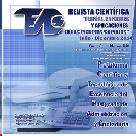Axiological elements of information systems oriented professional management decision as holder
Keywords:
systems, axiological elements, making ethical decisionsAbstract
In this article a paradigmatic version to decision makers at the administrative level based on the axiological elements of information systems is proposed. Which was developed in three stages beginning in investigating the main features of systems to support decision making, followed in a second step, the determination of the elements considered by management professionals regarding the decision-making process ethical through technology, to finally develop a systematic reflection of the axiological aspects of the use of information systems based on the significance levels of the elements involved in using these in making ethical decisions from the perspective of middle managers and senior Venamcham1 affiliated companies participating in the program RSE2 robust information systems; concluding that the professional administrative area as decision maker, direct or indirect user information systems, has joint responsibility with the computer field staff to be aware and take action regarding abuse of information technology in the areas of work within their organizations, including the proper discharge of its role as a vital human resource information systems that are used in organizations, and beyond is a member of a society.
Downloads
References
Laudon, Kennethc y Laudon, Jane P. (2002) Sistema de Información Gerencial, 6ta. Ed. Prentice Hall, México.
Cohen, Daniel y Asín, Enrique. (2005). Sistema de Información Gerencial para los Negocios, 3ra. ED. McGrawHill/Interamericana, Editores, S. A. México, D. F.
O'Brien, James A. (2005) Sistemas de Información Gerencial. 4ta. Edición. Ed. Irwin McGrawhill, Colombia.
O'Brien, J. A.; Marakas, G.M. (2006): Sistemas de información gerencial. 7ª Edición. México: McGraw-Hill.
Luhmann, Nicklas y De Giorgi, Rafaelle. (1993). Teoría de la Sociedad. Universidad de Guadalajara-Universidad Iberoamericana Instituto Tecnológico y de Estudios Superiores de Occidente. México
Simón, Herbert A. (1972). El Comportamiento Administrativo. 2da Edición. Editorial Aguilar, Barcelona, España.
Cyert, R. M. y March, J.(1975). Teoría de las decisiones económicas de la empresa. Ed. Herrero. México.
Moody, Paul. (1991). Toma de decisiones Gerenciales. Editorial MacGraw-Hill Latinoamirecana, S.A. Bogotá. Colombia.
Hartman, Robert. (2000). Validity Studies Of The Hartman Value Profile Model. Value Resource Group.
Burk, Ignacio. (1982). Filosofía. Una Introducción Actualizada. Ediciones Insula. Caracas. Venezuela.
Ortiz,Rafael. (1999). Introducción a La Teoría General De Los Valores y a La Axiología Jurídica. Editorial Universidad Católica Andrés Bello. Caracas. Venezuela.
Graves, Claire. (2004). Levels of Human Existence. Ed. William R. Lee. Eclet Publishing.
Neuman, Peter (1995). Computer-Related Risk. ACM Press. New York. Estados Unidos.
Published
How to Cite
Issue
Section
Derechos del/de autor/es a partir del año de publicación
Esta obra está bajo la licencia:
Creative Commons Reconocimiento-NoComercial-CompartirIgual 4.0 Internacional (CC BY-NC-SA 4.0)
Las opiniones expresadas por los autores no necesariamente reflejan la postura del editor de la publicación ni de la UCLA. Se autoriza la reproducción total o parcial de los textos aquí publicados, siempre y cuando se cite la fuente completa y la dirección electrónica de esta revista. Los autores(as) tienen el derecho de utilizar sus artículos para cualquier propósito siempre y cuando se realice sin fines de lucro. Los autores(as) pueden publicar en internet o cualquier otro medio la versión final aprobada de su trabajo, luego que esta ha sido publicada en esta revista.



